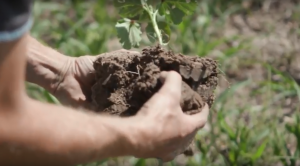My region is finally getting some rain, after going seven months without any meaningful precipitation. Very welcome, and also gives me an excuse to stay indoors and tackle some of those magazines that have piled up on my desk over the summer.
I picked up a Scientific American that came last August and thumbed my way to page 12, where alarm bells rang. The two-page article was titled, Pesticides are Killing Our Soils. And the sub-title declared, “They harm worms, beetles and thousands of other vital subterranean species.” It was written by Nathan Donley, director for the Center for Biological Diversity, and Tari Gunstone, research assistant at the center.
When the word “pesticides” is used in Scientific American, it usually means bad hype for those of us who grow crops. That was the first alarm. The second was the word “vital.” Millions of acres of desert soils around the world lack earthworms and other invertebrates, and also a productive and diverse microbiome. Yet they produce fabulous crops when provided water and nutrients. Hydroponic farmers grow crops in gravel or other soilless (and microbiomeless) mediums. Plants can also be grown by just misting the roots with a nutrient solution. A developing industry has sprouted near big cities that grows leafy greens indoors using artificial light and growing mediums. The industry has even gained “organic” status from government regulators (under protest from organic growers who use soil).
So the word “vital” is hype.
That said, I don’t mean to imply that worms, beetles, and thousands of other subterranean species, plus a diverse supply of beneficial fungi and bacteria, are not good for a healthy, productive soil. The emphasis here is on beneficial, because the soil is not a benign, everybody-gets-along place. It’s a battleground, where every species vies for resources and space. Some bacteria use antibiotics for defense and/or offense. Poisonous alkaloids are used by some fungi and plants for the same purpose.

The key to a healthy, productive soil is a good, continuous supply of organic matter so that a food chain can develop to keep the good guys happy and the predatory species in check. Keep a crop growing, cover or cash, at all times if the local climate permits. Plants leak carbohydrates from their roots, providing food for bacteria and transferring carbon from the atmosphere to the soil. This is the first link in the circular food chain that consumes the organic matter and releases nutrients back to the growing crop.
So, are pesticides killing this circular chain in a healthy soil? I decided to take a look at the author’s supporting data, a 20-plus page article published on line in May, 2021: Pesticides and Soil Invertebrates: A Hazard Assessment.
First of all, the study was funded by the Friends of the Earth and the center that the authors work for. The researchers reviewed nearly 400 studies from around the world on effects of pesticides on non-target invertebrates. The studies encompassed 284 different active ingredients and 275 species. They did not study effects on fungi or bacteria. If a species exhibited a change in “mortality, abundance, biomass, behavior, reproduction, biochemical biomarkers, growth, richness and diversity,” or a “structural change,” it was tabulated as a pesticide exposure effect. They found that 70.5 percent of pesticide exposures resulted in a negative effect, 1.4 percent in a positive effect, and 28.1 percent in no effect.
The reviewers separated studies done in a laboratory from those done in fields. Field studies (the real world) resulted in less negative effects from a pesticide than a laboratory test on the same pesticide (52.6 percent vs. 81 percent). If an effect was temporary, say three out of 10 days or one out of six years, it was still counted as a negative effect (or positive if, rarely, that was the case).
They did not include data on fate of a pesticide, such as half-life in the soil, or data on how much of a pesticide intended for plants falls off-target onto the soil. To me this is a significant omission, since most pesticides these days are metabolized by soil organisms or dismantled by other decomposition routes within weeks or at most a year. Any effects on a particular population, even some lethality, will be temporary.
Earthworms were the most studied invertebrate in the laboratory, and beetles in the field. Beetles (including weevils) are often the target of insecticides. The authors didn’t disclose if effects were on beneficial or destructive beetles. As to earthworms, I expect any effects were temporary, however that is not discussed. Anyhow my observation is that any effect from a pesticide application in a field is less damaging than a tillage operation that kills some earthworms and exposes great numbers to birds.
In my opinion, this review by the center and paid for by the Friends of the Earth is more hype than substance.
Jack DeWitt is a farmer-agronomist with farming experience that spans the decades since the end of horse farming to the age of GPS and precision farming. He recounts all and predicts how we can have a future world with abundant food in his book “World Food Unlimited.” A version of this article was republished from Agri-Times Northwest with permission.



